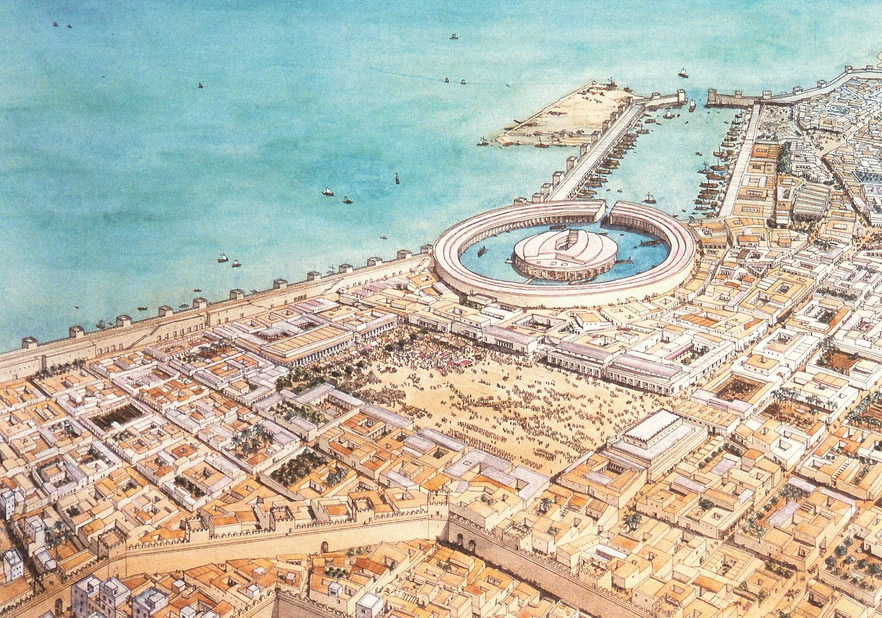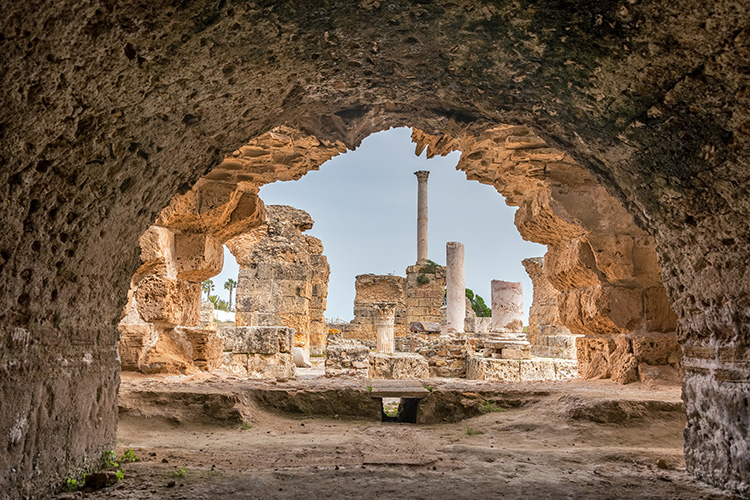Have you ever considered how a name, steeped in thousands of years of history, might inspire greatness on a modern field? The very mention of "Carthage" conjures images of an ancient superpower, a city of immense wealth and strategic brilliance that once stood as a formidable force in the classical world. It's a name that, in a way, carries the weight of empires and epic struggles. When we hear "Carthage football," it's almost like connecting that storied past with the competitive spirit of today's game, isn't it?
This legendary city, based on what today is northern Tunisia, was truly a marvel. Founded by the Phoenicians in the ninth century BC, Carthage reached its height in the fourth century BC, becoming one of the largest metropoleis on Earth. It was, quite simply, a central hub of activity and influence, a place where history was constantly being made.
So, what does this ancient powerhouse have to do with the gridiron? While the historical records provided speak volumes about its ancient might, they do not, of course, detail any historical "Carthage football" teams. Instead, we can explore the incredible legacy of this great city and consider how its enduring spirit and strategic prowess might, in some respects, resonate with the competitive drive and tactical depth seen in football today.
Table of Contents
- Founding and Early Might: A City of Grand Ambition
- Economic Prowess and Trade Empire: The Engine of Ancient Power
- A Rival to Rome: Clashing Titans of the Western Mediterranean
- The Enduring Legacy of Carthage: A Name That Echoes Strength
- Carthage Football: The Spirit on the Field
- Frequently Asked Questions About Carthage and Its Legacy
Founding and Early Might: A City of Grand Ambition
Carthage, a great city of antiquity, found its beginnings on the north coast of Africa, a place that is now a residential suburb of Tunis, Tunisia. According to tradition, the Phoenicians of Tyre established this remarkable settlement in 814 BC. This founding wasn't just a simple act; it marked the genesis of a civilization that would profoundly shape the ancient Mediterranean world. It became, quite frankly, the capital city of its own distinct civilization, a testament to its early success and rapid development.
By the ninth century BC, the Phoenicians had laid the groundwork for what would become a truly dominant entity. Carthage quickly grew into one of the most important trading hubs of the ancient Mediterranean. This strategic location, very much at the crossroads of maritime routes, allowed it to flourish economically and culturally. It was, apparently, one of the most affluent cities of the classical world, a place where riches flowed and innovation thrived.
The city's influence wasn't confined to its immediate surroundings. As a center of its civilization, Carthage's reach extended far and wide. It was, in some respects, a beacon of prosperity and power, drawing people and resources from across the region. Its early growth was incredibly impressive, paving the way for centuries of influence and, later, intense rivalry.
Economic Prowess and Trade Empire: The Engine of Ancient Power
Carthage, founded by the Phoenicians in the 9th century BCE, did not focus on growing and conquering land in the way some other empires did. Instead, it was found that Carthage was focused on growing trade and protecting trade routes. This distinct approach shaped its entire existence and, in a way, defined its power. It was a dominant trading empire, controlling vast territories through its economic might and influencing the Mediterranean region for centuries.
The city's prosperity was largely built upon its extensive commercial network. Carthage was, very much, a hub for goods and ideas, facilitating exchanges that enriched its coffers and expanded its sphere of influence. The trades through Libya, for example, were crucial territories for its commercial operations. This focus on commerce allowed it to accumulate immense wealth, making it a truly affluent center in the classical world.
Its economic structure was incredibly robust, allowing it to support a powerful navy that protected its valuable trade routes. This maritime strength was a direct result of its commercial ambitions. Carthage was, essentially, a mercantile superpower, using its economic leverage to exert control and maintain its position in the region. This strategic choice, to prioritize trade over territorial expansion, was rather unique for its time and allowed it to flourish in a distinct manner.
The city's affluence was legendary. It was a place where wealth was evident in its infrastructure, its culture, and its ability to project power. This economic foundation was, arguably, the true source of its long-standing dominance in the western Mediterranean. Discover the ancient ruins of Carthage, and you can still, even today, get a sense of its legendary status, a city that truly commanded respect and resources.
A Rival to Rome: Clashing Titans of the Western Mediterranean
At the start of the First Punic War, Carthage was the dominant power of the western Mediterranean, with an extensive maritime empire. This was a critical point in ancient history, as it set the stage for one of the most epic rivalries the world has ever seen. Rome, meanwhile, was the rapidly ascending power in Italy, a growing force that was, quite frankly, on a collision course with Carthage's established dominance.
Carthage was a contemporary superpower with the Roman Republic of the second and third century B.C.E. It was its rival for dominance of the western Mediterranean, a struggle that would define an era. The Carthaginians, based on what today is northern Tunisia, not only posed a direct threat to Roman expansion but nearly destroyed the upstart empire before it ever began. This speaks volumes about Carthage's military and strategic capabilities.
The Punic Wars, a series of conflicts between these two titans, were incredibly brutal and long-lasting. They were, in a way, a battle for the very soul of the Mediterranean. Carthage's naval supremacy was initially a significant advantage, allowing it to control vital sea lanes and project power across the region. However, Rome's tenacity and adaptability proved to be a formidable challenge.
The history, culture, accomplishments, and eventual fall of Carthage, the prosperous North African city that was destroyed by Rome in 146 BC, offer powerful lessons. Its political structure, economic prosperity, and military strategies were, arguably, among the most advanced of their time. The story of its rivalry with Rome is a compelling narrative of power, ambition, and ultimate destruction, a truly pivotal moment in ancient history. You can explore its empirical history and stunning views overlooking the Gulf of Tunis, which really puts its strategic importance into perspective.
The Enduring Legacy of Carthage: A Name That Echoes Strength
Even after its destruction by Rome in 146 BC, the name "Carthage" has continued to resonate through the ages. It's a name that, in a way, embodies resilience, strategic thinking, and the pursuit of power. The city's founding by the Phoenicians in the 9th century BC set in motion a trajectory of dominance that left an indelible mark on the ancient world. It truly was one of the largest metropoleis in the world during its height, a fact that, you know, speaks to its incredible scale and influence.
The very idea of Carthage evokes images of a civilization that was both innovative and incredibly determined. Its focus on trade, its powerful navy, and its ability to challenge the rising might of Rome all contribute to its enduring legend. It was, quite simply, a civilization that commanded respect and, in many respects, shaped the geopolitical landscape of its time.
The ruins of Carthage, still visible today as a residential suburb of Tunis, Tunisia, serve as a tangible reminder of its past glory. They offer a chance to explore its rich history and stunning views overlooking the Gulf of Tunis. This historical depth gives the name "Carthage" a certain gravitas, a sense of ancient power that is still felt today. Learn more about ancient Mediterranean history on our site.
Carthage Football: The Spirit on the Field
When we consider the phrase "Carthage football," it’s not about finding historical records of ancient games, because, frankly, the provided texts focus entirely on the city's political and economic history. Instead, it’s about how the powerful legacy of ancient Carthage might, in some respects, inspire the spirit and approach of a modern football team. Imagine a team bearing this name; what qualities would it embody?
A team representing "Carthage football" might be characterized by strategic brilliance, much like the ancient city's focus on protecting its trade routes and its maritime empire. Just as Carthage was a dominant power in the western Mediterranean, a football team named after it could strive for dominance on the field, employing cunning tactics and well-thought-out plays. It's about being smart and purposeful in every move, very much like a successful trading empire.
Consider the resilience of Carthage, which, despite facing a direct threat from Roman expansion, nearly destroyed the upstart empire before it ever began. This sheer tenacity, this refusal to yield, is a quality that any football team would aspire to. A "Carthage football" squad might be known for its ability to bounce back from adversity, to fight until the very last whistle, embodying that ancient spirit of never giving up, even against overwhelming odds.
The ancient city's affluence and status as one of the most important trading hubs could also be metaphorically linked to a team's pursuit of excellence and resources. A "Carthage football" team could be seen as a well-resourced, highly organized unit, much like the prosperous north African city itself. This speaks to a commitment to investing in talent, training, and infrastructure to achieve peak performance.
Ultimately, the idea of "Carthage football" is about channeling the historical might and enduring legacy of a truly great ancient city. It’s about taking inspiration from its strategic depth, its economic prowess, and its incredible resilience in the face of powerful rivals. A team carrying this name would, you know, inherently carry a sense of history and a drive to compete with the same determination that once defined a classical superpower. You can explore more about ancient civilizations and their lasting impact.
Frequently Asked Questions About Carthage and Its Legacy
Was there an ancient football team named Carthage?
No, the historical texts provided describe ancient Carthage as a powerful city-state, a trading empire, and a rival to Rome. There is no mention of a sport resembling modern football or any ancient "Carthage football" team within these historical accounts.
What made ancient Carthage so powerful?
Ancient Carthage's power stemmed largely from its economic prosperity and its extensive maritime empire. It was a dominant trading hub, controlling vast territories and trade routes, which made it one of the most affluent cities of the classical world. Its strategic location on the north coast of Africa was also, quite frankly, a huge advantage.
How did Carthage influence the Mediterranean region?
Carthage influenced the Mediterranean region for centuries primarily through its dominant trading empire. It was a central hub of civilization, controlling vital trade routes and becoming a major rival to the Roman Republic for regional dominance. Its legacy includes significant contributions to naval power and economic strategy.



